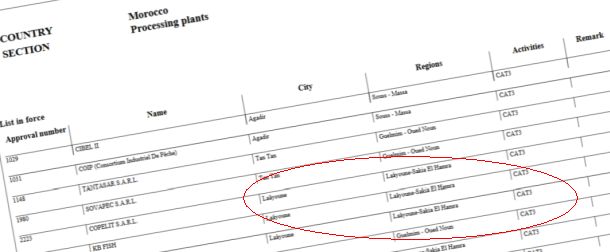
While the highest Court of the EU has stipulated that no trade arrangement with Morocco can be applied to Western Sahara, the EU Commission this month visited the occupied territory to update the list of companies authorised to export their products to the EU.
"Please be informed that this mission, of a purely technical nature and organised by the Directorate General for Health and Food Safety of the European Commission [DG SANCO], will visit veterinary offices in several towns. It is an audit mission which aims at verifying existing sanitary control systems with a view on updating the list of companies authorised to export their products to the EU", the Commission wrote in reply to a Saharawi organisation asking to meet the delegation.
The Commission admitted that the trip to the territory took place on 7 December 2017. It stated that no civil society meetings were scheduled "due to the (...) technical nature and context of the mission."
18 December, WSRW sent a letter to DG SANCO, asking for clarifications on the legal basis for such a list or visit - given that no EU trade arrangement currently applies to Western Sahara and Morocco's lack of sovereignty over the territory.
In December 2016, the Court of Justice of the European Union ruled that no EU Association or Trade Agreement could be applied to the territory of Western Sahara, as it has a "separate and distinct" status to Morocco. The only way for any EU arrangement to affect the territory, the Court stated, is via the explicit consent of the people of the territory.
One of the direct implications for this ruling is the end of preferential access to the EU market for goods coming from occupied Western Sahara (although the exact implementation of this legally binding obligation remains unclear). In June 2017, the EU Commission sent notice to the EU Member States' customs authorities to differentiate between products coming from Morocco and Western Sahara.
"The European Commission is now acting directly against the decision of the Court of Justice. This mission to the occupied territory is in total contradiction of the signals that it previously gave the EU customs authorities. There is no legal framework in place today governing EU-Western Sahara trade", said Davide Contini from Western Sahara Resource Watch.
DG SANCO's lists of authorised exporters from Morocco were updated over the summer of 2017. To date, these lists, such as the authorised exporters of fishery products or the authorised exporters of processed fish products, include establishments operating in occupied Western Sahara.
The Saharawi liberation movement, Polisario Front, condemned the Commission's visit to the territory. Read their full statement below.
POLISARIO CALLS FOR URGENT LEGAL CLARITY OVER EU COMMISSION VISIT TO WESTERN SAHARA
(BRUSSELS, 18 DECEMBER) On the 7th December a technical delegation from the European Commission conducted an official visit to the city of Laayoune in Western Sahara. The city remains illegally occupied by Morocco, and the European Commission has failed to make public; important legal issues concerning the visit.
Commenting today, Polisario EU Representative Mohammed Sidati said:
"We are not surprised to see the Commission once again acting in bad faith – there are serious legal issues concerning this visit that must be urgently clarified.
The stated purpose for this visit was ‘updating the list of companies authorised to export their products to the EU’. The ECJ ruling of December 2016 made clear that Western Sahara, including the city of Laayoune, is not part of Morocco. The Commission must therefore legally obtain the consent of the Sahrawi people, in whose Territory Laayoune sits, to trade or undertake bilateral relations with any companies in Western Sahara: this is required under EU and international law. We therefore call on the Commission to confirm publicly that none of the companies with whom the delegation met in Laayoune currently export any products to the EU. This would be a clear & serious violation of EU law. In parallel, the Commission must immediately disclose the territorial scope of the visit and the delegation’s mandate, to confirm that both were in compliance with the ruling of the ECJ.
Polisario unequivocally condemns all deliberate attempts by EU institutions and Member States to undermine the ECJ ruling of December 2016 – including through clear failure to comply with it. Good-faith is required for a credible political settlement in Western Sahara – and we are disappointed that the some Member States and Institutions have decided take a destructive approach which only threatens to undermine the UN Political Process. We call on the European Commission to demonstrate its commitment to a genuine and sustainable political settlement by undertaking an official, transparent, and unrestricted visit to Western Sahara - as part of a comprehensive assessment of the political, economic, and human rights situation."
Dirty green energy on occupied land
How can it be wrong to develop renewable energy, in a world that is in desperate need for a green transition? In Western Sahara, the problems are numerous.
EU Court adviser confirms separate and distinct status of Western Sahara
The Advocate General of the EU’s top Court backs the legal status of the people of Western Sahara. Final Judgment expected in a few months.
EU Court adviser: fruit from Western Sahara should not be labelled as from Morocco
Labelling those products as originating in the Kingdom of Morocco instead of originating in Western Sahara breaches EU law, the Advocate General of the EU Court of Justice concludes.
COWI abandons future projects in Western Sahara
After undertaking work for the Moroccan state phosphate company in Western Sahara, the Danish consultancy giant COWI states that it “will not engage in further projects" in the occupied territory.



